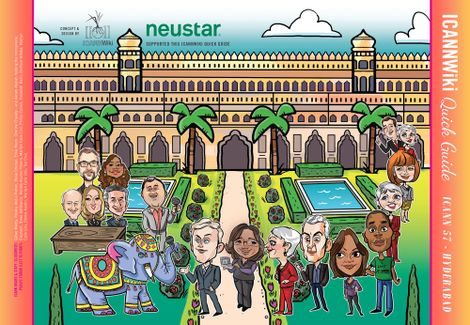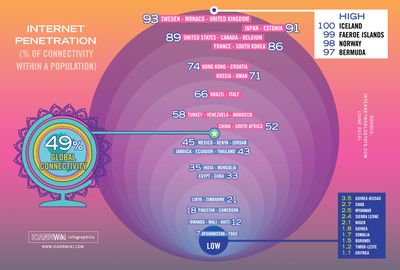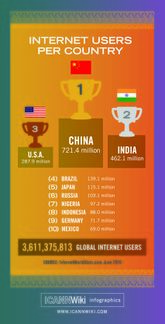ICANN 57 Quickie: Difference between revisions
No edit summary |
No edit summary |
||
| Line 6: | Line 6: | ||
<div> | <div> | ||
<div class="navbutton">[[ICANN 58 Primer#Get_Involved|<span style="color:white">Infographics</span>]]</div> | <div class="navbutton">[[ICANN 58 Primer#Get_Involved|<span style="color:white">Infographics</span>]]</div> | ||
<div class="navbutton">[[ICANN 58 Primer# | <div class="navbutton">[[ICANN 58 Primer#IANA_Transition|<span style="color:white">IANA Transition</span>]]</div> | ||
<div class="navbutton">[[ICANN 58 Primer# | <div class="navbutton">[[ICANN 58 Primer#Universal_Acceptance|<span style="color:white">Universal Acceptance</span>]]</div> | ||
<div class="navbutton">[[Acronyms|<span style="color:white">Acronyms</span>]]</div> | <div class="navbutton">[[Acronyms|<span style="color:white">Acronyms</span>]]</div> | ||
</div> | </div> | ||
| Line 83: | Line 83: | ||
"The IANA function was an impractical, ineffective tool for exerting ICANN accountability. NTIA saw opportunity for reform in exchange for a power they could never use. As a bonus, doing so strengthened the multistakeholder model by ensuring equal balance of power among Internet stakeholders. Multilateral forces do want to control, fracture and fragment the Internet - and this made their job exceptionally harder. The best part of the whole process was (and always is) the community, who insisted on the CCWG, which continues to effectively insert accountability measures throughout the ecosystem. The IANA stewardship transition is a grand bargain, that has already led us to a stronger, safer and more secure Internet."</div> | "The IANA function was an impractical, ineffective tool for exerting ICANN accountability. NTIA saw opportunity for reform in exchange for a power they could never use. As a bonus, doing so strengthened the multistakeholder model by ensuring equal balance of power among Internet stakeholders. Multilateral forces do want to control, fracture and fragment the Internet - and this made their job exceptionally harder. The best part of the whole process was (and always is) the community, who insisted on the CCWG, which continues to effectively insert accountability measures throughout the ecosystem. The IANA stewardship transition is a grand bargain, that has already led us to a stronger, safer and more secure Internet."</div> | ||
</div></div></div> | </div> | ||
<h1 class="sectionheader"><span style="padding:0 0 0 15px;font-size:2.5vw;">Primers</span></h1> | |||
ICANNWiki Primers familiarize you with important concepts in the Internet Governance space. | |||
<div class="flexbox mw-collapsible mw-collapsed"> | |||
==Universal Acceptance== | |||
===How to Get the Next Billion Online: Be Part of the Fight for Universal Acceptance=== | |||
'''This article was provided by UASG Universal Acceptance (Steering Group).''' | |||
3.2 billion people are online worldwide, according to the International Telecommunication Union (ITU), and around 45 percent of all households have access to the Internet. Despite these impressive figures, it has only been recently since people with languages based on non-Latin alphabets have started being able to use the Internet to its fullest extent in their mother tongue. This is a result of the Domain Name System (DNS) supporting non-ASCII characters in domain names, more specifically support for Unicode characters in internationalized domain names (IDN) and e-mail address internationalization (EAI). | |||
Though Internationalized domain names and e-mail addresses now exist for multiple languages and alphabets – e.g. Han, Cyrillic, Hangul, Thai, Arabic, Hebrew and Greek – help is still needed from the community to bring the rest of the systems that touch the Internet up to modern standards, to achieve what is now known as Universal Acceptance. To achieve Universal Acceptance, Internet applications and systems must treat all TLDs in a consistent manner, including new gTLDs and internationalized TLDs. Specifically, they must accept, validate, store, process and display all domain names. | |||
A large portion of the software and systems that the Internet relies upon today are not yet compliant with the standards of Universal Acceptance. Not all online portals are primed for the opening of a user account with one of these new e-mail addresses. While filling out online forms, Top-level domains that exceed the previous standard length of two or three characters and e-mail addresses that are based on unicode are not always accepted. To give you one example: Over 90% of all websites tested accept our ASCII@new-four-character-TLD, but less than 5% accept our unicode@idn.idn! | |||
The Universal Acceptance Steering Group (UASG) is an Internet community initiative that was founded in February 2015 and tasked with undertaking activities that will effectively promote the Universal Acceptance of all valid domain names and email addresses. The group is made up of members from more than 120 companies (including Apple, GoDaddy, Google, Microsoft and Verisign), governments and community groups. The UASG receives significant financial and administrative support from ICANN. | |||
Internet Service Providers are one of the cornerstones of the Internet Industry. Every e-mail, every request to show a website passes your systems on the application level. This is why the UASG is encouraging you to get all of your systems UA-ready and we seek your support to accomplish the UASG´s mission. A big first step would be to create a clearer picture of the status quo: How many UA issues do you, your engineers and your support staff receive per day, week or month? Share your experience with us and the industry. The UASG is working on an issue logging system to gather, structure and aggregate information to direct your and our resources in the right direction. | |||
We are particularly looking for ISPs to get involved not only from North America and Europe but from other parts of the world where internationalized domain names and e-mail addresses based on non-Latin scrips are more common. The UASG has developed core documentation to support your efforts and to help developers getting their tools and programming languages UA-ready. | |||
'''UNIVERSAL ACCEPTANCE STEERING GROUP WORKSHOP | |||
Thursday, November 3 09:00 - 13:45 | |||
Room: G.01/02''' | |||
</div> | |||
</div></div> | |||
==References== | ==References== | ||
Revision as of 01:01, 21 March 2017
Thanks for picking up the third edition of the ICANNWiki Quickie, an indispensable guide to ICANN57 in Hyderabad, India. Like ICANNWiki, this guide was built from the bottom-up. For instance, insteading of adding to the abundance of literature available on the IANA Transition, we decided to reach out directly to different stakeholders across the globe to get their thoughts on the transition. That is just one great example of how we approach the Quickie--we share what we know, learn from each other and move forward as one toward a meaningful and productive meeting.
Inside you’ll find an explanation of the many acronyms found in ICANN, primers of relevant topics, a new guide to visual editing on the wiki, fantastic infographics and much more!
-
ICANN 58 - Quickie -- DOWNLOAD .PDF
Infographics
Ever since ICANN55 in Marrakech, ICANNWiki has been visually representing data sets with our exciting new infographics. Our latest batch analyzes global internet connectivity trends, and includes a subtle focus on India. Click here to see more ICANNWiki Infographics.
-
Global Internet Penetration Rates & Internet Connectivity
(August 2016) -
Global Internet Users Per Country
(August 2016)
IANA Transition
There is an abundance of amazing content available surrounding the IANA Transition, and rightfully so. It has been a primary focal point of the community for the past two years. It was great to see the community taking the initiative to educate the world about the importance of the transition, especially when things became increasingly contentious.
In the ICANNWiki Quickie, we’ve decided to take a different approach. We wanted to focus on people from the global community who will benefit from transition, and let them tell the story.
IANA Transition: A Milestone Worth Celebrating[edit | edit source]
By Donna Austin - Policy and Industry Affairs Manager, Neustar
The announcement[1] that the transition of IANA functions to ICANN would indeed go ahead as planned resulted in a virtual round of congratulatory messages along with an almost audible collective sigh of relief from the global Internet community.
Since March 2014 the ICANN community, Board and the organization, has been consumed by activities associated with the transition. Countless parties from around the world have worked tirelessly to establish the necessary processes, bodies and measures required to ensure this transition could take place.
As Lawrence Strickling explained in his testimony[2] to the Senate hearing on Protecting Internet Freedom, reaching this milestone involved “more than 26,000 working hours” developing the IANA Stewardship Transition Proposal, “more than 33,000 messages on mailing lists” and “more than 600 meetings and calls”. The sheer magnitude of these numbers alone indicate the significance of this event and this work cannot go without congratulations and thanks.
On a personal note, I am grateful to have been a part Cross Community Working Group on IANA Transition, representing the Registry Stakeholder Group, that was responsible for developing the IANA Transition Proposal; and equally grateful that after more than two years of hard work our product was considered acceptable by the US Government. My colleague, Becky Burr, was also closely involved in the CCWG on Accountability, whose work was an integral component of the path to transition.
I extend my congratulations to all those in the global Internet community who have helped reach this significant milestone. This is just the beginning of an equally challenging and exciting task ahead, but it is certainly an achievement of which our entire community should be proud and testament to the multistakeholder model upon which ICANN was founded.
IANA Ironies[edit | edit source]
By Steve Crocker - Chair, ICANN Board of Directors
"No one expected addressing and naming to be either difficult or contentious. Close to fifty years ago, when the early network visionaries focused on transforming computer-to-computer communication and opening up an untold range of applications, no one paid any attention to the “minor” details of addressing and naming. As the Internet exploded in the 1990s. the naming system had become a very big deal. The small and fairly informal process Jon Postel had been carrying out on behalf of the community needed a more formal structure. ICANN was born in late 1998 with the explicit task of housing the IANA function. The U.S. Government intended to oversee ICANN’s execution of the IANA just temporarily. “Temporarily” was estimated to be about two years. Eighteen years later, the U.S. Government has finally stepped back from its role of overseeing ICANN. We – and by “we” I mean the entire global Internet community – are now in charge of the system. It is both nothing and everything. Internet users saw no change in the operation of the Internet when the IANA contract came to an end. On the other hand, we have now embarked on a whole new phase in governance of identifier system of the Internet. I think we’re in very good shape, but I wonder what our successors say 20 and 50 years from now."
Personal Testimonials[edit | edit source]
"The last day of October 2016 marked a date which the Global South watched with great expectation. I was in LACNIC 26/LACNOG 16 for my first time. One of the greatest events of internet governance in the region, further energized by the announcement of this date: the official date when the IANA contract with the US government ended. This was the moment when ICANN became in control of the “Internet’s address book”.
Up until the last minute of confirmation of the transition, LACNIC joined over 200 people in a hotel auditorium in Costa Rica. At this yearly meeting, technical and economical themes about the internet market are discussed. But that week, something seemed very different. The IANA transition was in everyone’s mind. The new team for IANA ended the day with a round of applause and celebration. The internet belongs to all and the excitement to have this guaranteed was in everyone’s mind. So next steps do predict a lot of work but collaborative work, as our collective richness of knowledge online should have.""The IANA transition event means nothing: it’s what we now do with it that counts.
History is replete with independence movements that culminated in disarray. To succeed, hard-won independence must be followed with responsible and disciplined actions. Actions that reflect the very values that fueled the independence movement in the first place.
Throughout this long and difficult process, the ICANN community showed its resilience and unequivocal readiness to take charge of its new weighty responsibilities. I have no doubt that our community will rise to the challenge of implementing the operational and accountability frameworks we all designed together. The eyes of the broader global community are monitoring our progress: failure will impact much more than the ICANN community, strengthening those who believe in top-down governance for the digital space and beyond.
Watching ICANN soar to the necessary heights of responsibility, accountability, and inclusivity will mean the most to me and to everyone who longs to see transnational governance working."Primers
ICANNWiki Primers familiarize you with important concepts in the Internet Governance space.
Universal Acceptance[edit | edit source]
How to Get the Next Billion Online: Be Part of the Fight for Universal Acceptance[edit | edit source]
This article was provided by UASG Universal Acceptance (Steering Group).
3.2 billion people are online worldwide, according to the International Telecommunication Union (ITU), and around 45 percent of all households have access to the Internet. Despite these impressive figures, it has only been recently since people with languages based on non-Latin alphabets have started being able to use the Internet to its fullest extent in their mother tongue. This is a result of the Domain Name System (DNS) supporting non-ASCII characters in domain names, more specifically support for Unicode characters in internationalized domain names (IDN) and e-mail address internationalization (EAI).
Though Internationalized domain names and e-mail addresses now exist for multiple languages and alphabets – e.g. Han, Cyrillic, Hangul, Thai, Arabic, Hebrew and Greek – help is still needed from the community to bring the rest of the systems that touch the Internet up to modern standards, to achieve what is now known as Universal Acceptance. To achieve Universal Acceptance, Internet applications and systems must treat all TLDs in a consistent manner, including new gTLDs and internationalized TLDs. Specifically, they must accept, validate, store, process and display all domain names.
A large portion of the software and systems that the Internet relies upon today are not yet compliant with the standards of Universal Acceptance. Not all online portals are primed for the opening of a user account with one of these new e-mail addresses. While filling out online forms, Top-level domains that exceed the previous standard length of two or three characters and e-mail addresses that are based on unicode are not always accepted. To give you one example: Over 90% of all websites tested accept our ASCII@new-four-character-TLD, but less than 5% accept our unicode@idn.idn!
The Universal Acceptance Steering Group (UASG) is an Internet community initiative that was founded in February 2015 and tasked with undertaking activities that will effectively promote the Universal Acceptance of all valid domain names and email addresses. The group is made up of members from more than 120 companies (including Apple, GoDaddy, Google, Microsoft and Verisign), governments and community groups. The UASG receives significant financial and administrative support from ICANN.
Internet Service Providers are one of the cornerstones of the Internet Industry. Every e-mail, every request to show a website passes your systems on the application level. This is why the UASG is encouraging you to get all of your systems UA-ready and we seek your support to accomplish the UASG´s mission. A big first step would be to create a clearer picture of the status quo: How many UA issues do you, your engineers and your support staff receive per day, week or month? Share your experience with us and the industry. The UASG is working on an issue logging system to gather, structure and aggregate information to direct your and our resources in the right direction.
We are particularly looking for ISPs to get involved not only from North America and Europe but from other parts of the world where internationalized domain names and e-mail addresses based on non-Latin scrips are more common. The UASG has developed core documentation to support your efforts and to help developers getting their tools and programming languages UA-ready.
UNIVERSAL ACCEPTANCE STEERING GROUP WORKSHOP Thursday, November 3 09:00 - 13:45 Room: G.01/02
References[edit | edit source]
- ↑ Testimony of Assistant Secretary Strickling on Protecting Internet Freedom: Implications of Ending U.S. Oversight of the Internet - Stewardship of IANA Functions Transitions to Global Internet Community as Contract with U.S. Government Ends, ICANN.org.
- ↑ Testimony of Assistant Secretary Strickling on Protecting Internet Freedom: Implications of Ending U.S. Oversight of the Internet, NTIA.doc.gov.




